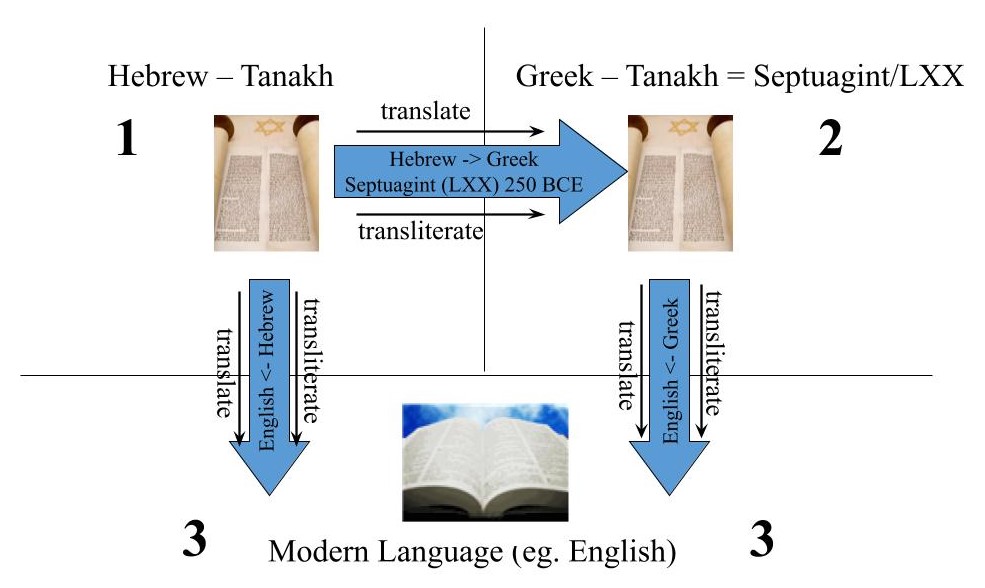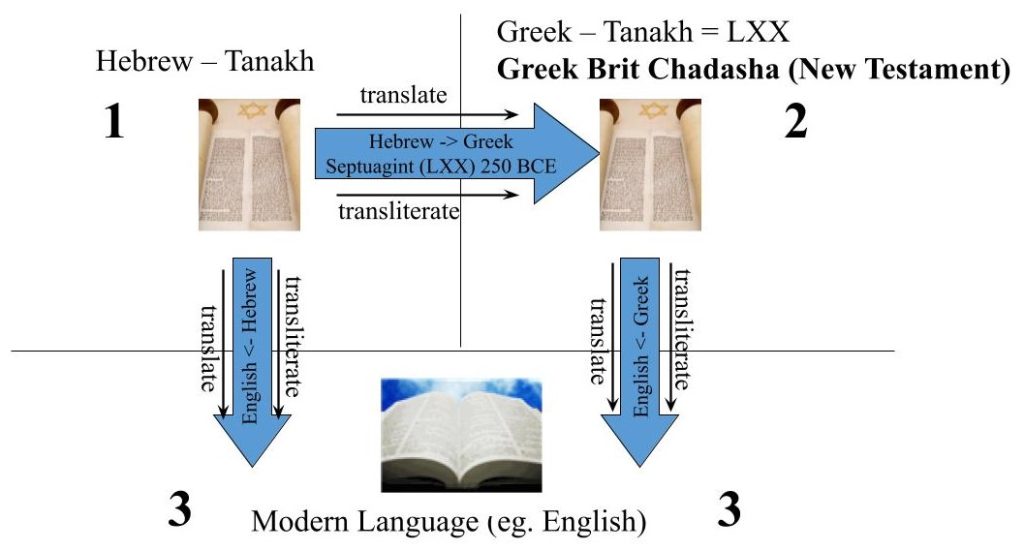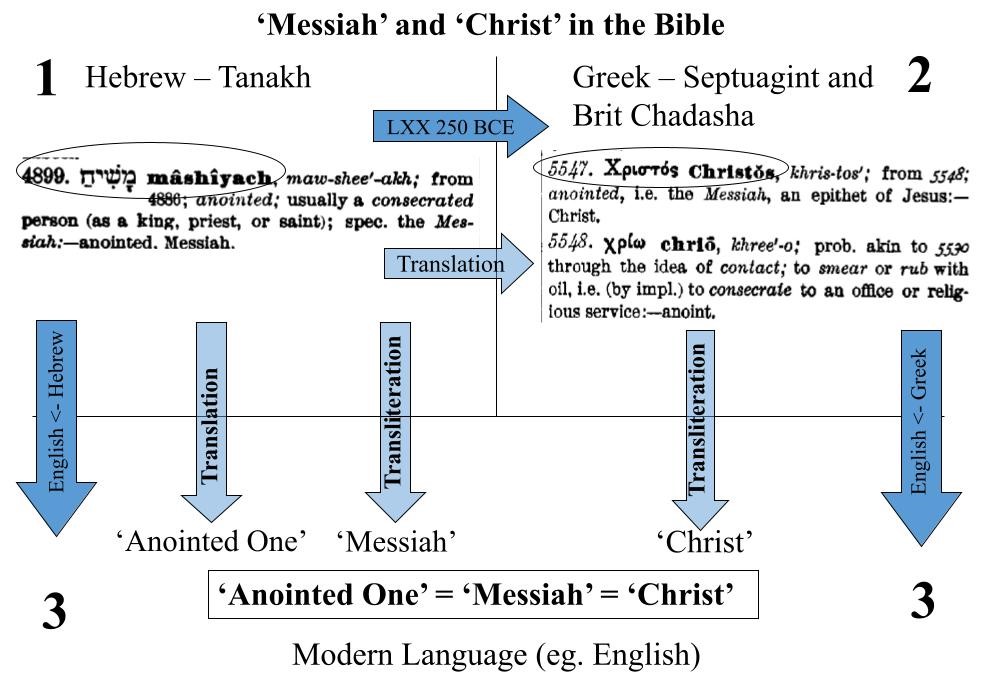The anticipation of a coming ruler ‘Messiah’ is central to conventional Jewish thought. But where does the idea and the term ‘Messiah’ come from? What is the relationship between ‘Messiah’ and ‘Christ’? Is ‘Christ’ simply some sort of Christian term or idea? It turns out that all these words have their origins in the Tanakh and in how it was translated thousands of years ago. Here we look at where these words come from and what the Tanakh says about Messiah. But first we survey the Torah on this Coming One.
Messiah in Torah
This Coming One is first introduced in the Torah (though without using the term ‘Messiah’). In fact, the Messianic promise of a Coming One was first given back in the Garden of Eden. At this early date, the promise of His victory in conflict is simply outlined. But later, when the patriarch Jacob blessed his twelve sons before his death he foresaw a coming ruler. In blessing Judah, Jacob said:
“Judah, your brothers will praise you;
your hand will be on the neck of your enemies;
your father’s sons will bow down to you.
9 You are a lion’s cub, Judah;
you return from the prey, my son.
Like a lion he crouches and lies down,
like a lioness—who dares to rouse him?
10 The scepter will not depart from Judah,
nor the ruler’s staff from between his feet.
until he to whom it belongs shall come
and the obedience of the nations shall be his. (Genesis 49:8-10)
Since the other sons of Jacob (i.e. the other Israelite tribes) would ‘bow down’ to Judah, and Judah would have ‘the scepter’ (symbolic of rule), this oracle promised a monarchy coming from the tribe of Judah – which was fulfilled when David came to the throne. But the prophecy also looked further into the future. Paradoxically, it predicted that rule would not depart from Judah until a ‘he’ comes – someone who has a right to the “ruler’s staff” (This ‘he’ is called שִׁילֹה literally ‘he whose it is’ or Shiloh). When the ‘he’ who has the right to rule finally comes, then rule will be removed from Judah! This ‘he’ will also get ‘the obedience of the nations’ (so it is not about David). Once again, as with G-d’s covenant with Abram, the nations are in sight, foreseeing that the nations will be ‘his’.
The later prophetic books in the Tanakh describe this coming one using the title ‘Messiah’ but that word does not appear in all translations. To understand why, we need to touch on the history of Bible translation.
Translation vs. Transliteration
Known as transliteration, translators sometimes choose to translate by similar sound rather than by meaning. For example, ‘shalom’ is a transliteration from the Hebrew שלום which means ‘peace’. Translators can bring שלום into English as either ‘shalom’ (by transliteration of sound) or ‘peace’ (by translation of meaning). For the Tanakh, translators had to decide whether words (especially names and titles) should be translated by meaning or through transliteration (by similar sound). There is no hard rule; sometimes it is better to translate and other times one transliterates.
The Septuagint
The Tanakh was first translated into Greek between 250 – 132 BCE and this translation is known as the Septuagint (or LXX). The Babylonian Talmud says that 70 rabbis translated this work in Alexandria, Egypt at the request of Ptolemy II. Thus the Septuagint was an early translation work by Jewish scholars for Greek-speaking Jews of the diaspora and Gentiles who had an interest in the prophetic writings.
Translation & Transliteration in the Septuagint
The figure below shows this translation process and how it impacts modern-day Bibles

The original Hebrew Tanakh is shown in quadrant #1 and is available today as the Masoretic Text. The Greek Septuagint is in quadrant #2. The bottom half (#3) shows a modern language Bible (e.g. English). Because the Septuagint was a Hebrew-to-Greek translation the figure displays a blue arrow going from quadrant #1 to #2. For all steps (#1->#2, #1->#3, #2->#3) translators decided on transliteration or translation of names and titles as explained above, illustrated by labeling transliterate and translate around the arrows.
After the Septuagint was completed and used across the Jewish Diaspora in the Greco-Roman world, the Greek Brit Chadasha was written. This was key in the development of the term ‘Messiah’. Since the Brit Chadasha was written in Greek and had many quotations from the Tanakh it used the Greek Septuagint, rather than the Masoretic Hebrew, for its source of quotes. This is illustrated in the next figure.

Messiah and Christ from the Bible
Now we focus on the word ‘Messiah’, following the historical process explained above.

The original Hebrew title in the Tanakh was ‘mashiyach’ (משיח) which is defined as an ‘anointed or consecrated’ person. Priests and kings in the First Temple Period were anointed (ceremonially rubbed with oil) before they took office, thus they were mashiyach. But prophecies in the Tanakh predicted a specific mashiyach, anointed by G-d, who was coming. When the Septuagint was developed in 250 BCE, the rabbis chose a Greek word with a similar meaning, Χριστός (sounds like Christos, which came from chrio, which meant to rub ceremonially with oil). Therefore the rabbis brought the original Hebrew ‘mashiyach’ into the Greek Septuagint through translating the word Christos by its meaning (not transliterated by sound). The Jewish writers of the Brit Chadasha understood Yeshua of Nazareth to be this person prophesied in the Tanakh, but since they wrote in Greek they used the Greek word Christos from the Septuagint, not ‘mashiyach’.
For modern-language Bibles (like English), the Tanakh was translated directly from Hebrew (#1 to #3). Some translators chose to translate by meaning into variations of Anointed/Anointed One, and others transliterated by sound to Messiah. So we can interchange Anointed with Messiah since they both come from the same Hebrew word ‘mashiyach’ (משיח) – one by transliteration and the other by meaning. Similarly, Christos came via translation from the same Hebrew word ‘Mashiyach’ (#1 to #2). This was then transliterated by similar sound from Greek to modern languages like English to make the term ‘Christ’ (#2 to #3). So ‘Christ’ is a very specific title rooted in the Hebrew Tanakh, derived first by translation from Hebrew to Greek, and then by transliteration from Greek to modern languages. It is the same as Messiah.
To summarize,
‘Christ’=’Messiah’=’Anointed One’=משיח
which was a specific prophetic title in the Tanakh.
Messiah in Psalms
Now we are ready to see where ‘Messiah’ comes in the Tanakh. Psalm 2, penned by King David about 1000 B.C.E., introduces Messiah in this way:
The kings of the earth rise up
and the rulers band together
against the Lord and against his Anointed, saying,
3 “Let us break their chains
and throw off their shackles.” (Psalm 2:2-3)
We can interchange this ‘Anointed’ with ‘Messiah’, or ‘Christ’. What can we learn about this Messiah? The Psalm continues.
4 The One enthroned in heaven laughs;
the Lord scoffs at them.
5 He rebukes them in his anger
and terrifies them in his wrath, saying,
6 “I have installed my king
on Zion, my holy mountain.”7 I will proclaim the Lord’s decree:
He said to me, “You are my son;
today I have become your father.
8 Ask me,
and I will make the nations your inheritance,
the ends of the earth your possession.
9 You will break them with a rod of iron;
you will dash them to pieces like pottery.”10 Therefore, you kings, be wise;
be warned, you rulers of the earth.
11 Serve the Lord with fear
and celebrate his rule with trembling.
12 Kiss his son, or he will be angry
and your way will lead to your destruction,
for his wrath can flare up in a moment.
Blessed are all who take refuge in him. (Psalm 2: 4-12)
We see here that Adonai calls the Anointed/Messiah ‘my son’. G-d identifies His Messiah as ‘His son’. This is therefore where the term ‘Son of God’ originates and is thus another equivalent term for ‘Messiah’.
Jews have historically been known to be waiting for their Messiah (or Christ). Why? Because the Tanakh prophesied that He would come.
The Messiah anticipated in 1st Century
Herod the Great and Messiah
Below is the reaction of Herod the Great (4 BCE) when the Magi from the East came looking for the Messiah, part of the Nativity story. Notice, ‘the’ precedes Messiah.
3 When King Herod heard of this he became very agitated, and so did everyone else in Yerushalayim.
4 He called together all the head cohanim and Torah-teachers of the people and asked them, “Where will the Messiah be born?” (Matthew 2:3-4)
The idea of ‘the Messiah’ was accepted between Herod and his religious advisors –and is used here without referring specifically to Yeshua. Why? Because Jews had been reading Psalm 2 for hundreds of years before Herod the Great was born.
Messiah and Son of God.
At his trial, Yeshua is brought before the High Priest who asks him:
The cohen hagadol said to him, “I put you under oath! By the living God, tell us if you are the Mashiach, the Son of God!” (Matthew 26:63)
We see by how the question is phrased that the Jewish High Priest effortlessly inferred ‘Son of God’ from Messiah. Where did he get the idea that ‘Son of God’ is an extension of Messiah? From Psalm 2.
Messiah in Tanakh: Specified like a lock-n-key system
The fact that the Tanakh explicitly predicts a coming Messiah makes it stand unique across the vast sea of literature that has been produced through history. It is like a lock. Locks are designed in a certain shape so that only a specific ‘key’ that matches the lock can unlock it. In this way the Tanakh is a ‘lock’ with specifications that become more and more precise through the prophetic passages. (Already we have seen some in Abraham’s sacrifice, Adam’s beginning, and Moses’ Passover). This raises a very Jewish question: Is Yeshua the matching ‘key’ that unlocks the Tanakh? We continue to explore this question later, but for now reflect on the paradox of the prophecy that Jacob gave to Judah. Judah continued in self-rule (albeit under Roman supervision) in the land of Israel until shortly after the coming of Yeshua. Forty years later the Roman legions destroyed Jerusalem and sent the Jews into worldwide exile – destined to live under the rule of other nations as Moses had foreseen. All this while ‘the nations’ orbited into Yeshua’s teaching as per Jacob’s oracle. A two-sided, synchronized fit between the ‘lock’ of that short prophecy and the ‘key’ of Yeshua. Perhaps the question is worth looking into.
The way to do so is to examine how the prophets of Nevi’im and Ketuvim (Isaiah, Jeremiah, Zechariah, Daniel etc.) specified the details forming the ‘lock’ for the Messiah. These specifications have implications for us living 2500+ years later. We take that up next.